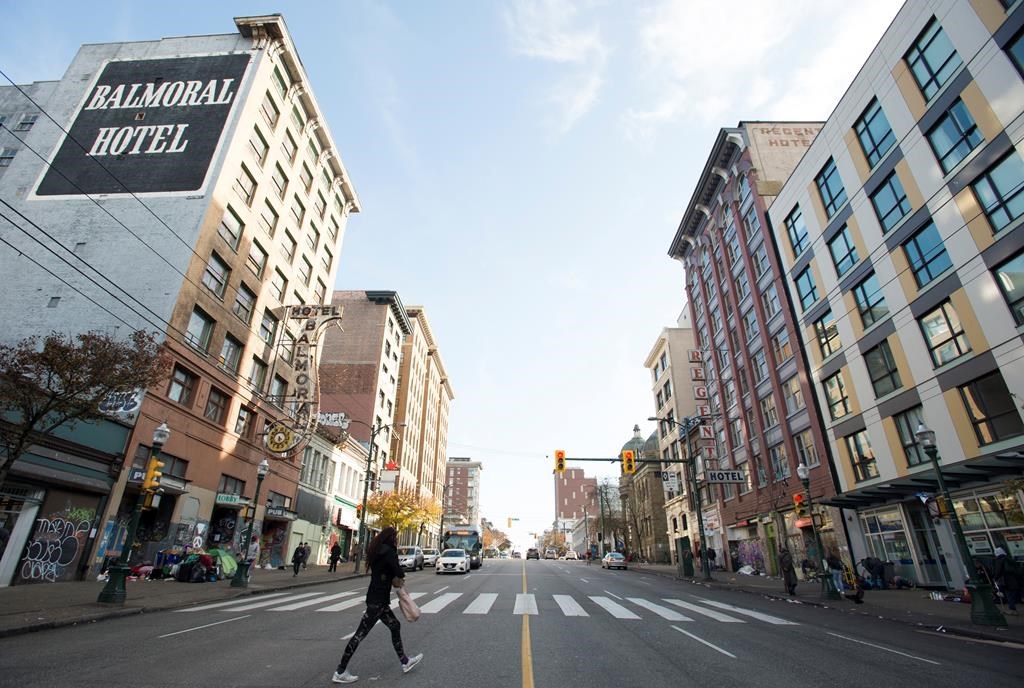A recent threat against women and staff at a downtown Vancouver women’s centre has sparked a conversation about violence against women, a crisis exacerbated by the COVID-19 pandemic.

On Sunday, a man holding a meat cleaver was arrested after threatening to kill people at the Downtown Eastside Women’s Centre.
In a news release, Vancouver police said the suspect had walked away and dropped the knife on the ground, and applauded the “quick-thinking witnesses” who picked up the weapon, called 911 and identified him, facilitating the arrest.
Several Downtown Eastside women’s organizations are now decrying what they called police “spin” on the incident.
The Vancouver Police Department’s news release focused on the successful arrest of the suspect while failing to acknowledging the larger, daily crisis of sexualized and gender-based violence against women, they said.
“The police responded to a 911 call, but the issue of violence in the community continues and has escalated, and the systemic responses from the VPD are inadequate,” Alice Kendall, executive director of the Downtown Eastside Women’s Centre, told Global News in an interview.
“And not just from the VPD as a system but all of the systems — federally, provincially, locally.”
The women’s organizations, including Battered Women’s Support Services, WISH Drop-In Centre Society and Atira Women’s Resource Society, said Vancouver police used the incident to “look like heroes.”

In its news release, police said, “Many violent crimes go unreported in the Downtown Eastside, and this arrest was made possible because several people acted quickly and did the right thing.”
Kendall said it was the training, expertise and cool heads of Downtown Eastside Women’s Centre staff, who locked the man out of the centre, that ensured no one was hurt in the disturbing incident.

Get daily National news
The VPD’s comment about “unreported” crimes is a “well-known fact,” the organizations added in a press release, and wasn’t sensitive to the fear of retaliation and repercussion faced by many women who don’t report those crimes.
- New charges against man with al-Qaida ties as lawyer raises mental health concerns
- Man appealing human smuggling convictions can represent himself: U.S. judge
- Canadian fugitive arrested in Spain over major Desjardins data leak
- Supervised consumption sites aren’t linked to increased crime: McGill study
Instead, police should have recognized that such acts of violence against women are not uncommon in the area and indicated how seriously they take the crisis, Kendall said.
“Why is it that there are no outcomes to these horrific situations to improve circumstances for women in this neighbourhood? Why do we not have a pandemic plan that is supported by all levels of government and all systems to actually address what is a horrendous situation for women in the community?” she asked.
The organizations called on governments to develop a co-ordinated response to the “shadow pandemic” of gender-based violence in the Downtown Eastside.
The crisis existed before COVID-19, they explained, but overlapping crises of homelessness, a toxic drug supply, worsening health conditions and a lack of access to basic needs have made it worse.

In a written response to the organizations’ criticisms, Sgt. Steve Addison said Vancouver police work hard to address crime and poverty in the Downtown Eastside, including gender-based violence.
The department is part of SisterWatch, a standing committee that addresses violence against women in the community, he said, and the VPD’s domestic violence and criminal harassment unit added additional investigators to its team during the pandemic to address the increased need.
“We meet regularly with partner agencies – (Ministry of Children and Family Development), Vancouver Aboriginal Child and Family Services, BC Housing, BC Corrections, among others – to identify current issues that affect domestic violence victims and their safety,” said Addison.
“Our staff has access to emergency funds that can be used to pay for lock changes, relocation costs, gas, bus tickets, and other expenses for victims fleeing violent relationships. We provide free emergency phones with data to victims who don’t have cellular phones, so they can call 9-1-1 if they feel unsafe or need police.”
The women’s groups’ press release said certain police practices, such as street sweeps, do not contribute to women’s safety and waste municipal resources.
Addison agreed that street sweeps are not the most “appropriate” use of police resources, but said officers don’t participate in them directly.
“At the request of the City of Vancouver, officers accompany sanitation workers who pick up debris that piles up along East Hastings Street,” he explained.

Last year, the Battered Women’s Support Services reported a 300-per cent increase in calls for its support as economic stress and social isolation increased during the COVID-19 pandemic.
The organization responded to just under 32,000 requests for aid in 2020, an increase of 18,000 from 2019.
Violence against women has increased across Canada during the pandemic, and last year, the Canadian Femicide Observatory for Justice and Accountability reported 92 women and girls were killed in the first six months of 2021.
That’s an increase from 78 during the same period in 2020 and 60 in 2019.








Comments